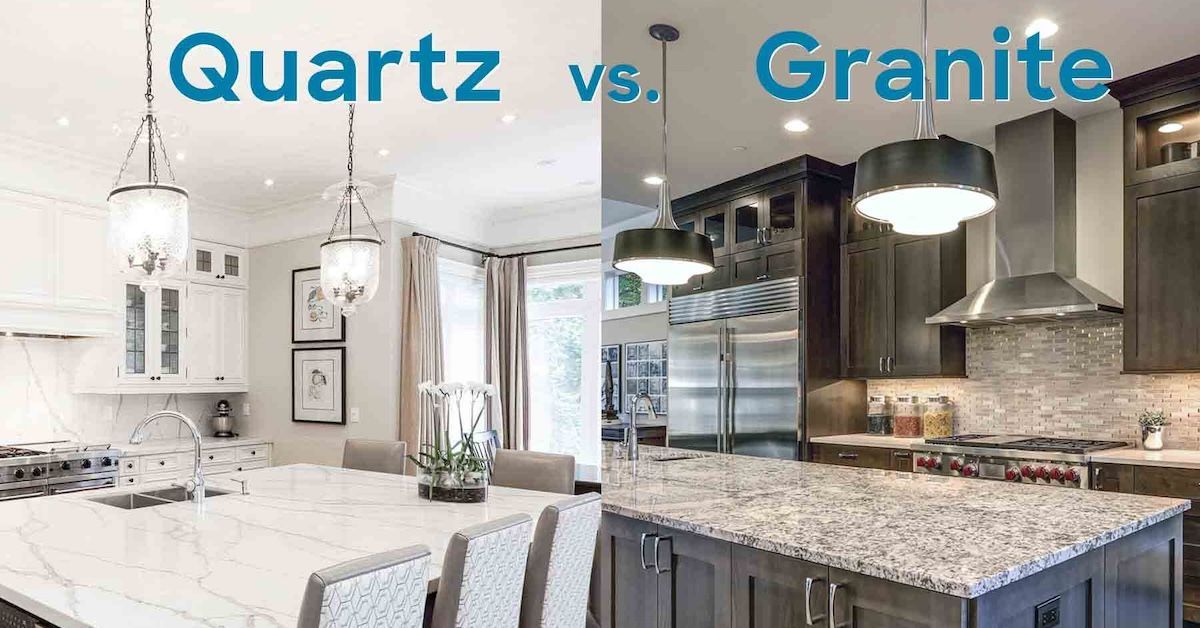What Are the Differences Between Quartz and Granite Countertops?
Choosing a countertop is one of the biggest decisions you'll make during a kitchen or bathroom remodel. It’s not just about picking something that looks nice—it's about finding a surface that can handle everything from coffee spills to hot pans, while still making your space look amazing. Two of the most popular options out there are quartz and granite. They’re both strong, stylish, and durable, but they’re also different in ways that matter. If you're stuck between the two, this breakdown can help you figure out which one’s the better fit for your home.

Granite: One-of-a-Kind, Naturally
Granite is 100% natural stone, pulled straight from the earth, sliced into slabs, and polished for use in your kitchen or bath. What makes granite stand out is its unique patterns and color variations. No two pieces are exactly alike, which means if you love a one-of-a-kind look, granite has you covered. You’ll see everything from soft neutrals to bold, dramatic swirls of black, red, or green, depending on where the stone was quarried. It’s a great pick if you want your countertops to be a focal point.
Quartz: Engineered for Consistency
Quartz isn’t mined in big slabs like granite. It’s engineered using natural quartz crystalsmixed with resin and pigments, which gives it a smooth, consistent appearance. This means you can choose a design and get exactly what you saw in the showroom—no surprises. Quartz also comes in a huge variety of styles, including looks that mimic marble or granite. If you’re going for a clean, modern vibe or you want something that perfectly matches your cabinet color, quartz gives you more control over the final look.
Looks Matter, But So Does Strength
Both materials are tough, but they handle wear and tear a bit differently. Granite is incredibly hard and heat-resistant, so you don’t have to panic every time you set a hot pan on the counter. That said, it can be prone to chipping if something heavy hits it just right. Quartz, while also strong, has a slight edge when it comes to flexibility. That makes it less likely to crack from impact. However, quartz doesn’t like extreme heat—so it’s a good idea to use trivets or hot pads to keep it protected.
Cleaning and Maintenance: What You Should Know
Granite has pores. That means if you spill oil, wine, or tomato sauce, and don’t wipe it up quickly, it can stain. To avoid that, granite needs to be sealedabout once a year, depending on the slab and how heavily it’s used. It’s not hard to do, but it is something to remember.
Quartz is non-porous, so it doesn’t require sealing and is super easy to clean. Just wipe it down with soap and water, and you’re good. It’s also more resistant to bacteria since spills don’t soak into the surface. For low-maintenance kitchens, that’s a big plus.
Stain Resistance and Hygiene
If you’re worried about messes or food safety, quartz is the clear winner. Since it doesn’t have pores, it’s much better at resisting stains and keeping germs at bay. It’s a popular choice in households with kids or where a lot of cooking happens. Granite can be just as sanitary if properly sealed and cleaned regularly, but it needs a little more attention to stay in top shape.
Price: What’s the Real Cost?
Both quartz and granite are considered premium countertop materials, so they’re not cheap. Granite’s price varies a lot depending on the color, pattern, and rarity. You might find a more affordable granitethat’s just as strong as a pricier one—it really depends on the stone. Quartz tends to have a more consistent price range, but it can be slightly more expensive per square foot. The total cost also depends on how complex your layout is and whether you need cutouts for sinks, cooktops, or other features.
Installation and Customization
No matter which material you choose, professional installation is a must. These slabs are heavy and require precision cutting. Quartz is a bit easier to work with since it’s uniform and doesn’t have natural weak spots like granite can. With granite, seam placement and slab matching can be more challenging, especially if you want a continuous pattern across your counters. On the flip side, if you love the idea of showcasing a dramatic vein or rare stone, granite gives you that wow factor.
Thinking Green? Consider This
Granite is a natural product, but it’s mined from the earth and shipped long distances, which can leave a big environmental footprint. Quartz is manufactured, which means energy and chemicals are involved in the process, but many brands now offer eco-conscious options made with recycled materials. If sustainability matters to you, check for certifications or ask about where the materials come from and how they’re produced.
So, Which One Should You Pick?
There’s no wrong choice here, just the one that fits your lifestyle best. If you love natural beauty, don't mind a bit of maintenance, and want a countertop that’s uniquely yours, granite might be the way to go. If you’re more into consistency, low upkeep, and a wide range of design options, quartz could be your perfect match.
At Kitchen Discounters , we help homeowners find the right countertops for their space, style, and budget. Whether you’re leaning toward the natural charm of granite or the sleek reliability of quartz, we’ll guide you through the pros, cons, and everything in between. Visit us to see samples in person and get expert advice on which material is right for your kitchen or bathroom remodel.

